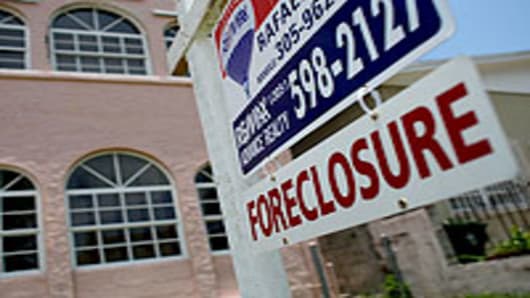Despite huge delays in foreclosure processing last year, following the so-called "robo-signing" paperwork scandal, sales of foreclosed properties still managed to account for nearly one in four home sales in the fourth quarter of 2011, up from one in five in the previous quarter.
In all of 2011, just over 907,000 homes in the foreclosure process or repossessed by lenders were sold to third parties, according to a new report by RealtyTrac.
"We expect to see foreclosure-related sales increase in 2012, particularly pre-foreclosure sales, as lenders start to more aggressively dispose of distressed assets held up by the mortgage servicing gridlock over the past 18 months," said RealtyTrac CEO Brandon Moore in a press release.
A pilot program by the regulator of Fannie Mae and Freddie Mac to sell 2500 foreclosures on their books in bulk to investors already has investors rushing to get in. Investor interest has already been heating up lately, with some Realtors reporting bidding wars in parts of California and Nevada, where supply fell due to bank delays. But it's not just bank-owned (REO) properties.
“We continued to see a shift toward pre-foreclosure sales, or short sales, and away from REO sales in the fourth quarter,” Moore continued. “Nationally, pre-foreclosure sales increased 15 percent from a year ago while REO sales decreased 12 percent. Pre-foreclosure sales outnumbered REO sales in several bellwether markets, including Los Angeles, Miami and Phoenix, where REO sales had outnumbered pre-foreclosure sales a year ago."
New streamlined programs and government incentives are helping, as lenders begin to see short sales (selling the home for less than the value of the mortgage) as a less costly alternative to foreclosure. While pre-foreclosure sales are up overall, they are way up in some of the hardest hit states, like Michigan (up 103 percent), Georgia (up 59 percent) and Arizona (up 48 percent).
The average price of a pre-foreclosure home in the fourth quarter of 2011 was 21 percent below that of a non-foreclosure home, according to RealtyTrac. The average discount on an REO property (foreclosure sale) was 36 percent. Foreclosures, however, still take about half as long to sell, as the short sale process is lengthy at an average 318 days to complete.
California, Florida, Arizona and Nevada accounted for more than half of all distressed sales in 2011, but their numbers are coming down, while other states like Georgia, Minnesota and Washington are seeing those sales increase. There is also a huge discrepancy between states that require a judge in the foreclosure process and states that do not. Judicial states, like New Jersey, are still seeing huge backlogs due to the robo-signing scandal, even as banks reached a $26 billion settlement with state and federal governments. It takes more than 900 days on average to foreclose on a New Jersey home.
As banks now work more quickly through more than 4 million delinquent loans and 2 million more in the foreclosure process, foreclosure sales are likely to increase through 2012. While the government is offering new incentives for banks to modify loans, many mortgages simply can't be saved. Home prices continue to fall nationally, putting more borrowers in a negative equity position, and thereby at a higher risk of default. While the economy is slowly improving, and jobs are coming back, analysts say it's not enough to save the bulk of loans that are already in trouble.
Questions? Comments? RealtyCheck@cnbc.comAnd follow me on Twitter @Diana_Olick



